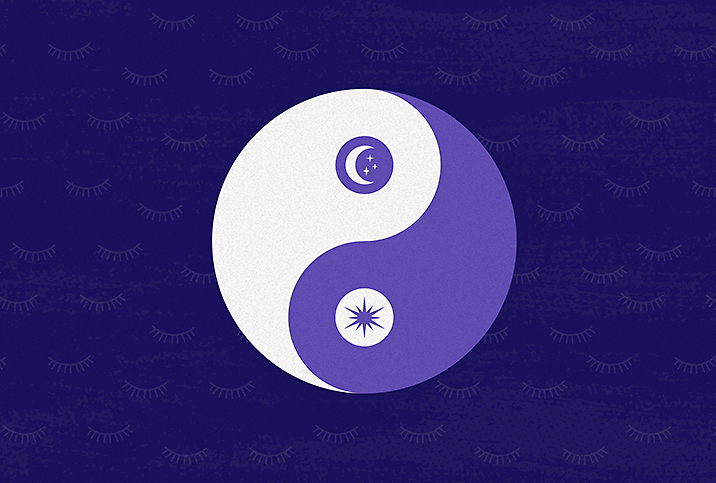Get Into the Rhythm! (Circadian Rhythm, That Is)

Circadian rhythms are internal mechanisms that tell our bodies when to sleep and when to wake up. The cycles rise and fall during a 24-hour day and are more commonly referred to as the sleep-wake cycle.
Most folks' circadian rhythm is in tune with the sun: During daylight hours and warmer temperatures, you're awake, and when the sun goes down and temperatures fall, it's time for bed.
"The circadian rhythm is influenced by and responds to environmental cues, such as light, giving us the day-night cycle," said Emmanuella Auguste, M.D. "In the context of biology, circadian rhythm is found in the hypothalamus, specifically the suprachiasmatic nucleus (SCN)."
The SCN can be described as the governing pacemaker of the circadian timing system regulating the circadian rhythms in the body.
The presence of light directly affects wakefulness, alertness and activity, and, Auguste added, "Contrarily, in the absence of light, circadian rhythm produces melatonin, which places our bodies in a state of rest—a period of regeneration and restorative sleep."
How circadian rhythms affect different age groups
Circadian rhythms shift throughout our life span, by approximately 30 minutes per decade starting in middle age, defined as being between 40 and 60 years old. This is evident when you consider how infants and children require longer hours of sleep as compared to adults. For adults, it's recommended to get a minimum of eight hours of sleep each 24-hour period.
"To maintain the human body at the optimal level of health, adequate sleep is needed," explained Auguste.
Disrupting circadian rhythms
There are many activities that can upset our circadian rhythms, such as staying up late or traveling across time zones. These simple disruptions can cause changes in both the mind and body.
Colleen, an insurance agent from Brooklyn, was diagnosed with sleep apnea. The impact it has on her sleep cycle has had further effects.
"I first noticed persistent fatigue and irritability," Colleen said. "I thought that I was just tired. The most significant change was weight gain. It took me months to realize that my disrupted sleep could be a factor."
New studies show the disruption of basic day-night cycles can lead to impulsive behavior and chronic fatigue, as well as changes to your metabolism, which can cause weight gain.
Research has been carried out on aircrews, who often cross time zones and regularly work when others would be sleeping. Whereas travelers overcome any circadian rhythm disruption in a week or so, aircrews are continually challenging their internal biological clocks and are more susceptible to changes in mood, difficulty getting to sleep and staying asleep, fatigue, stomach and intestinal issues, and more.
A study from 2015 involving 673 female flight attendants across more than 2 million single flights indicated flight attendants who worked more than 15 hours during regular sleep hours in their first trimester of pregnancy were at an increased risk of miscarriage.
"Sleep health is important because it determines one's ability to function," Auguste said. "While it's a state of inactivity, restorative sleep is necessary to allow the body to recuperate and promote an individual's well-being. When sleep health is impaired, that can lead to an increased risk of developing psychiatric illnesses, such as depression, insomnia or bipolar disorder. Lack of sleep can also exacerbate cardiovascular outcomes."
Getting back on track
If your circadian rhythm is disrupted, there are strategies that can help, the most obvious and best of which being to define a regular sleep schedule and stick to it. This may take a couple of weeks, but it will help reset your circadian rhythm.
Bright light therapy—also known as phototherapy—is another option that can help someone who has delayed sleep phase syndrome (DSPS). If you have DSPS, you go to sleep in the wee hours of the morning and have difficulty waking up the following day. People with the condition would actually get the prescribed amount of sleep they need if it weren't for pesky events like school and work that require early starts. Patients are exposed to appropriately timed bright artificial light to reorient circadian rhythm.
Melatonin supplements have become popular in recent years but must be taken at the right dosage and time to have the desired effect. Incorporating exercise into your daily routine can also improve sleep quality and duration. However, you should pay close attention to the time of day you work out, as exercise increases heart rate and causes the body to release endorphins, neither of which is helpful if you're trying to fall asleep.
Left to its own devices, the body will generally regulate its own sleep schedule unless disrupted by external forces. To maintain overall health and wellness, minimizing disruptions is key. If you find that sleep is still problematic even with disruptions eliminated, talk to your doctor about undergoing a sleep study.




















